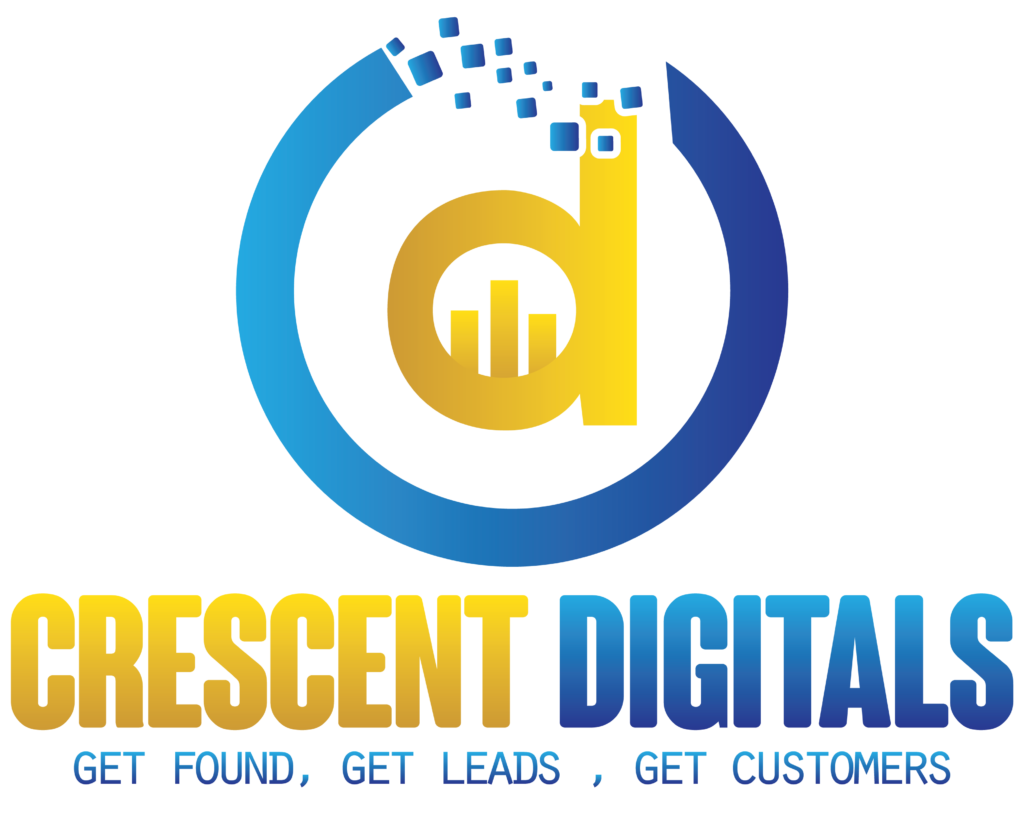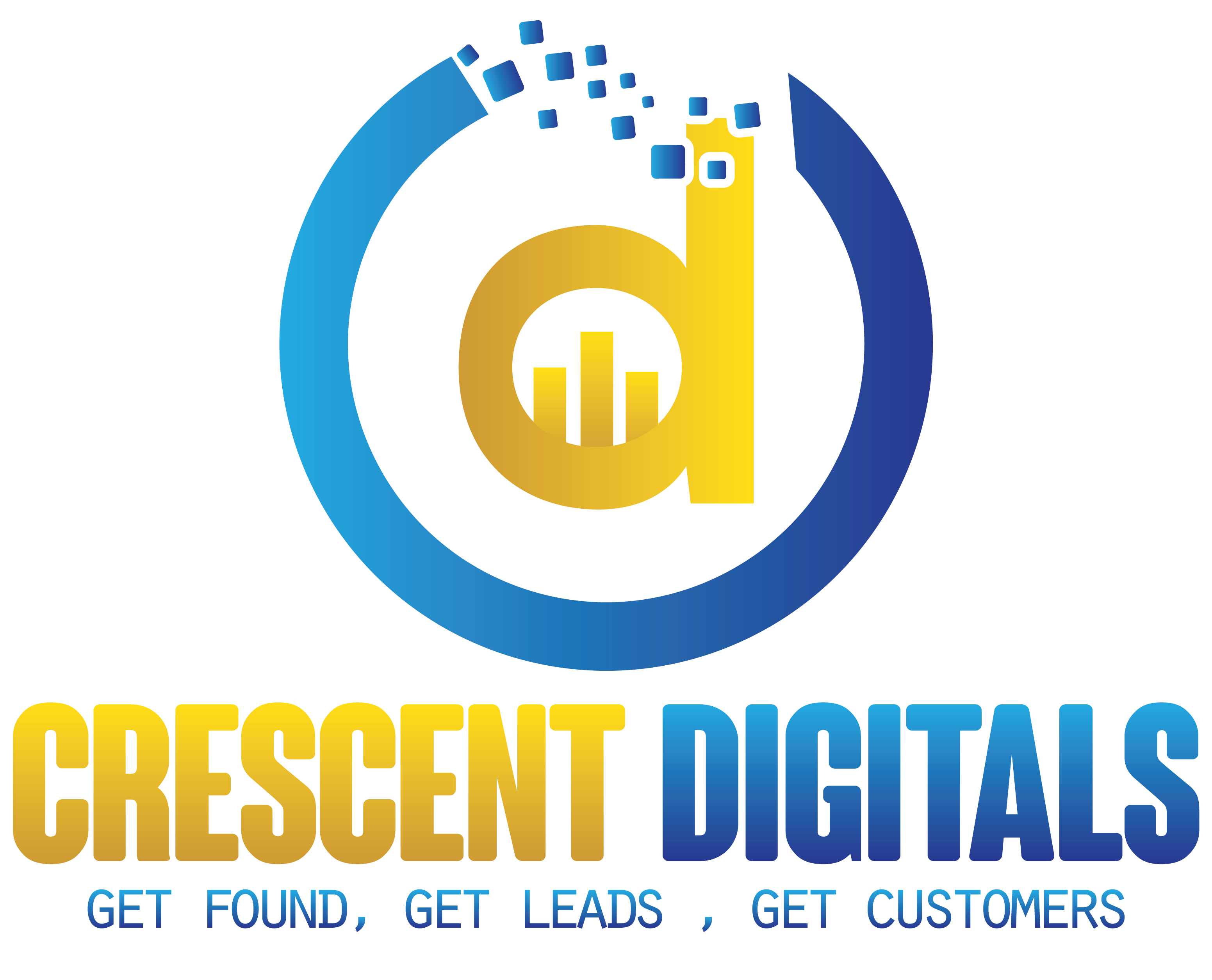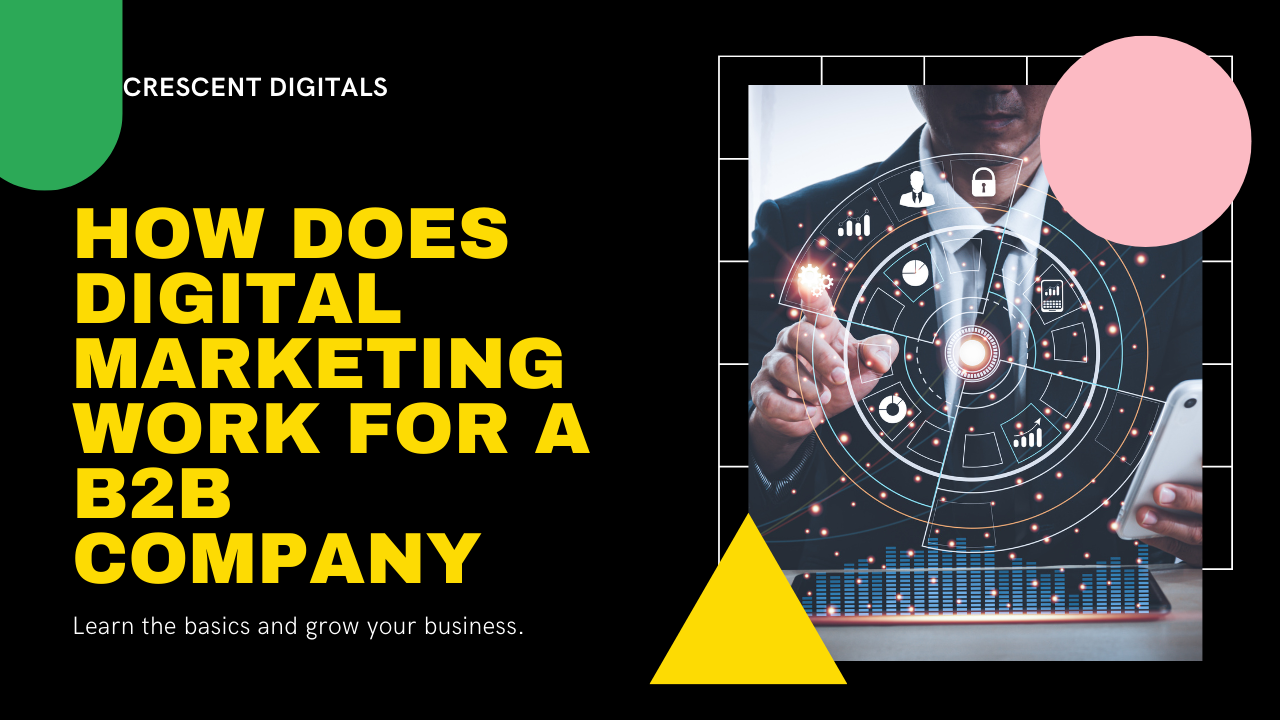How Does Digital marketing work for a B2B company, It involves creating a message, designing content, mapping content to the sales funnel, reaching the target audience, and nurturing. Contacting leads, and tracking the overall integrated marketing campaign. In today’s digital age, marketing efforts have shifted towards online channels.
For businesses that cater to other businesses, commonly known as B2B companies, digital marketing plays a crucial role in reaching their target audience and generating leads. Unlike B2C marketing, where the focus is on attracting individual consumers. B2B digital marketing strategies are tailored towards appealing to other businesses and organizations.
Digital marketing for B2B companies involves a multi-step process. It starts with creating a clear message that resonates with the target audience, followed by designing visually appealing content. Mapping the content to the sales funnel ensures that potential customers are engaged at every stage of their buyer’s journey. Once the content is ready, it’s time to reach the target audience through various online channels such as search engine optimization (SEO), social media marketing, and email marketing. Nurturing leads and establishing contact with them is essential to converting them into paying customers. Lastly, tracking the overall integrated marketing campaign allows B2B companies to measure their success. And make data-driven decisions for future marketing efforts. With the right digital marketing strategies in place, B2B companies can effectively promote their products or services to other businesses. And organizations in the digital landscape.
Understanding The B2b Landscape
When it comes to digital marketing, understanding the B2B (business-to-business) landscape is crucial for success. B2B companies operate in a unique market, with their marketing efforts focused on targeting other businesses rather than individual consumers. In this section, we will explore who a B2B company is, and identify its target audience. And discuss the unique characteristics and challenges of B2B marketing.
Who Is A B2b Company And Their Target Audience
A B2B company is an organization that provides products, services, or solutions to other businesses rather than end consumers. Their goal is to establish and nurture long-term relationships with their B2B clients, helping them solve specific business challenges or improve their operations.
The target audience of a B2B company consists of professionals in other businesses who are involved in the decision-making process. This includes executives, managers, procurement officers, and other key stakeholders. who have the authority. And influence to make purchasing decisions on behalf of their organizations.
Understanding the target audience of a B2B company is crucial for developing effective digital marketing strategies. By identifying their pain points, goals, and challenges. B2B marketers can create content and campaigns that resonate with their target audience, establishing themselves as experts and building trust.
Unique Characteristics And Challenges Of B2b Marketing
B2B marketing has several unique characteristics and challenges that differentiate it from B2C (business-to-consumer) marketing. These include:
- Longer sales cycles: Unlike B2C purchases, B2B sales cycles are often longer and more complex. This is because B2B purchases involve multiple decision-makers and require thorough evaluation and consideration before a final decision is made.
- Higher purchase value: B2B transactions generally have a higher purchase value compared to B2C purchases. This means that B2B marketers must provide compelling value propositions. and demonstrate a clear return on investment to justify the higher costs for their clients.
- Relationship-driven: B2B marketing relies heavily on building and maintaining relationships with clients. This includes personalized communication, providing ongoing support, and consistently delivering value to establish trust and loyalty.
- Expertise and thought leadership: B2B marketers need to position themselves as industry experts and thought leaders within their niche. This involves creating high-quality content, participating in industry events, and sharing valuable insights to establish credibility and attract potential clients.
- Complex decision-making processes: B2B purchases often involve multiple stakeholders and complex decision-making processes. B2B marketers need to understand the dynamics within their target organizations. And tailor their marketing messages to address the unique needs and preferences of each decision-maker.
Addressing these unique characteristics and challenges is essential for successful B2B digital marketing. By understanding the B2B landscape and adapting their strategies accordingly, B2B companies can effectively reach. And engage their target audience, drive lead generation, and ultimately, increase their bottom line.
Key Components Of Digital Marketing For B2b Companies
Digital marketing for B2B companies consists of creating targeted messages, designing effective campaigns, nurturing leads, and measuring overall campaign success. By utilizing SEO, content marketing, and social media, B2B companies can effectively promote their products. And services to other businesses and organizations.
Successful digital marketing strategies involve understanding the B2B audience and creating compelling content that resonates with their needs.
Building A Strong Online Presence
In today’s digital age, having a strong online presence is crucial for any business, especially for B2B companies. It is essential to establish your brand identity and make it visible to your target audience. A well-designed website that showcases your products or services highlights your expertise. And providing useful information is a key component of building a strong online presence. It acts as the face of your company, representing your brand values, and attracting potential prospects.
Additionally, optimizing your website for search engines and ensuring it is mobile-friendly is essential to improve your visibility in search engine result pages (SERPs). This leads us to the next key component of digital marketing for B2B companies – Search Engine Optimization (SEO).
Search Engine Optimization (seo) For B2b Companies
SEO is the process of optimizing your website to rank higher in search engine results, driving organic traffic to your site. For B2B companies, a targeted SEO strategy is crucial to attract potential buyers and increase brand visibility. By conducting keyword research, optimizing on-page and off-page elements, and creating high-quality content. you can improve your website’s search engine rankings and increase your chances of being found by your target audience.
Utilizing Content Marketing To Establish Authority
Content marketing is a powerful tool for B2B companies to establish authority in their industry and provide value to potential clients. By creating valuable and informative content such as blog posts, whitepapers, case studies, and e-books, you can position your company as a thought leader and trusted resource. This not only helps in attracting prospects but also nurtures existing leads, boosting customer loyalty, and driving conversions.
Leveraging Social Media For B2b Marketing Success
Social media platforms provide a unique opportunity for B2B companies to connect with their target audience and build brand awareness. By utilizing social media channels such as LinkedIn, Twitter, and Facebook. you can share your content, engage with your audience, and establish meaningful relationships. Additionally, social media advertising allows you to target specific demographics, increasing your reach. and visibility of your brand to potential buyers.
The Power Of Email Marketing For B2b Companies
Email marketing remains one of the most effective marketing channels for B2B companies. It allows you to communicate directly with your leads and prospects, nurturing them through the sales funnel. By delivering personalized and relevant content, you can build trust, establish relationships, and drive conversions. Implementing marketing automation software can streamline your email marketing efforts, enabling you to send targeted messages at the right time, further improving your chances of success.
Developing A B2b Digital Marketing Strategy
When it comes to digital marketing for B2B companies, having a comprehensive strategy in place is crucial for success. Developing a B2B digital marketing strategy involves several key steps that help businesses effectively reach their target audience and drive meaningful results. In this section, we will explore each step in detail to understand how it contributes to the overall strategy.
Setting Smart Goals For Digital Marketing Campaigns
In order to achieve success in B2B digital marketing, it is imperative to set SMART goals. SMART stands for Specific, Measurable, Attainable, Relevant, and Time-bound. This framework ensures that goals are clear, measurable, realistic, aligned with business objectives, and have specific deadlines. By setting SMART goals, B2B companies can track and evaluate the effectiveness of their digital marketing campaigns, making data-driven decisions for continuous improvement.
Identifying The Target Audience And Creating Buyer Personas
Understanding the target audience is essential for B2B digital marketing. By identifying the key characteristics, pain points, and motivations of the target audience, B2B companies can create accurate buyer personas. Buyer personas are semi-fictional representations of ideal customers. They help businesses tailor their marketing efforts to address the specific needs and preferences of their target audience, improving the overall effectiveness of their digital marketing strategies.
Choosing The Right Digital Marketing Channels For B2b Companies
In the vast digital landscape, not all channels are equally effective for B2B companies. It is crucial to select the right digital marketing channels that align with the target audience’s online behavior and preferences. B2B companies may find success using channels such as search engine optimization (SEO), content marketing, social media marketing, email marketing, and LinkedIn advertising. By focusing on the channels that resonate with their target audience. B2B companies can maximize their reach and engagement, ultimately driving qualified leads and conversions.
Creating A Content Marketing Plan For B2b Companies
Content marketing plays a pivotal role in B2B digital marketing strategies. It involves creating and distributing valuable, relevant, and consistent content to attract and engage the target audience. B2B companies must develop a content marketing plan. that outlines the types of content to create, the distribution channels to use, and the frequency of content production. A well-executed content marketing plan establishes B2B companies as industry thought leaders. Builds trust with the target audience and generates quality leads.
Setting Up Effective Lead Generation Strategies
Lead generation is a critical component of B2B digital marketing strategies. It involves capturing the interest and contact information of potential customers. B2B companies can set up effective lead generation strategies by offering valuable gated content, such as whitepapers or case studies, hosting webinars or virtual events, utilizing landing pages with lead capture forms, and implementing marketing automation tools. By generating a steady stream of qualified leads, B2B companies can nurture these leads and convert them into loyal customers.
In conclusion, developing a B2B digital marketing strategy requires careful planning and execution. By setting SMART goals, identifying the target audience, choosing the right channels, creating valuable content. and implementing effective lead generation strategies, B2B companies can navigate the competitive digital landscape and achieve their marketing objectives.
Implementing Successful B2b Digital Marketing Campaigns
Implementing successful B2B digital marketing campaigns involves creating tailored messages, designing effective strategies, mapping content to the sales funnel, reaching the target audience, nurturing leads, and tracking the overall campaign. By utilizing techniques like search engine optimization (SEO) and content marketing, businesses can effectively promote their products or services to other organizations.
Creating Compelling And Seo-friendly Content For B2b Companies
Creating compelling and SEO-friendly content is crucial for the success of any B2B digital marketing campaign. By crafting relevant, informative, and engaging content, you can attract and engage your target audience, establish your expertise in the industry, and drive organic traffic to your website.
Here are some key strategies to create compelling and SEO-friendly content for B2B companies:
- Keyword research: Conduct thorough keyword research to identify the terms and phrases your target audience is searching for. Use these keywords strategically in your content to improve organic visibility.
- High-quality blog posts: Regularly publish insightful and well-written blog posts that provide value to your readers. Offer solutions to their pain points, answer their questions, and provide industry insights.
- Case studies and whitepapers: Showcase your expertise and provide evidence of your success through detailed case studies and whitepapers. This type of content is highly valued by B2B decision-makers.
- Optimized landing pages: Optimize your landing pages with relevant keywords, compelling headlines, and concise copy that clearly communicates the value of your products or services.
- Multimedia content: Incorporate various types of content, such as infographics, videos, and podcasts, to cater to different preferences and enhance engagement.
- Content promotion: Implement an effective content promotion strategy, including social media promotion, influencer outreach, and email marketing, to increase the reach and visibility of your content.
Optimizing Website Design And User Experience For Lead Generation
Optimizing your website design and user experience is essential for converting website visitors into leads and driving the success of your B2B digital marketing campaigns. A visually appealing and user-friendly website can significantly improve your lead-generation efforts.
Here are some essential strategies to optimize your website design and user experience for lead generation:
- Intuitive navigation: Ensure your website is easy to navigate, with clear menus and logical information hierarchy.
- Clear call-to-action (CTA): Place prominent and compelling CTAs throughout your website to guide visitors towards desired actions, such as filling out a contact form or downloading a whitepaper.
- Mobile optimization: With the increasing use of mobile devices, it’s crucial to ensure your website is fully optimized for mobile viewing and offers a seamless user experience.
- Minimal load time: Optimize your website’s loading speed to avoid frustrating users and potential lead drop-offs.
- Conversion-focused landing pages: Create dedicated landing pages that are specifically designed to capture leads. Keep forms concise and easily accessible, and use persuasive copy and visuals to highlight the value of your offer.
Utilizing Marketing Automation Tools For B2b Companies
Marketing automation tools can streamline and enhance your B2B digital marketing efforts, saving you time and increasing the efficiency of your campaigns. These tools provide a range of features that help automate repetitive tasks, nurture leads, and track campaign performance.
Here are some key benefits of utilizing marketing automation tools for B2B companies:
- Lead nurturing: Automate email marketing campaigns to nurture leads at different stages of the buying journey, delivering personalized and relevant content.
- Lead scoring: Assign scores to leads based on their engagement and behavior, allowing you to prioritize your efforts and focus on the most qualified prospects.
- Segmentation: Divide your audience into targeted segments based on demographic, behavioral, or firmographic data. This allows you to deliver tailored messages and offers to specific groups.
- Workflow automation: Create automated workflows that trigger specific actions based on user behavior, such as sending follow-up emails, assigning sales tasks, or updating customer records.
- Analytics and reporting: Track and analyze the performance of your campaigns, measure the effectiveness of different channels, and gain valuable insights to optimize your overall marketing strategy.
Tracking And Analyzing The Success Of Digital Marketing Campaigns
Tracking and analyzing the success of your B2B digital marketing campaigns is essential to make data-driven decisions and continuously improve your strategy. By measuring key performance indicators (KPIs) and analyzing campaign results, you can identify what’s working and what needs adjustment.
Here are some important steps to track and analyze the success of your digital marketing campaigns:
- Define goals and KPIs: Clearly define your goals and identify the key metrics you’ll use to measure success. such as website traffic, lead conversion rate, customer acquisition cost, or ROI.
- Implement analytics tools: Set up and configure robust analytics tools, such as Google Analytics, to track. and measure the performance of your campaigns accurately.
- Create custom reports: Build customized reports that provide a clear overview of your KPIs, allowing you to easily monitor progress and identify areas for improvement.
- A/B testing: Conduct A/B tests to compare different variations of your marketing assets. and determine which elements yield the best results.
- Continuous optimization: Regularly analyze your campaign data, identify trends and patterns, and use this information to optimize your strategy, messaging, and targeting.
Best Practices And Tips For B2b Digital Marketing Success
Discover the best practices and tips for B2B digital marketing success without using commonly overused phrases. Learn how digital marketing works for a B2B company, including creating tailored content, implementing targeted programs, nurturing leads, and tracking integrated campaigns.
Building Strong Relationships Through Personalization And Account-based Marketing
In the world of B2B marketing, building strong relationships is crucial for success. One effective way to achieve this is through personalization and account-based marketing (ABM). By tailoring your marketing efforts to individual accounts, you can create a more personalized experience that resonates with potential clients.
Personalization involves analyzing data to segment your audience and deliver targeted content that addresses their specific needs and pain points. This can be done through email marketing campaigns, customized landing pages, and personalized product recommendations.
On the other hand, account-based marketing focuses on treating each account like a market of one. It involves identifying high-value target accounts and creating personalized marketing campaigns tailored to their specific needs. This approach allows you to create targeted content and offers that resonate with decision-makers within the account, ultimately increasing your chances of converting them into valuable customers.
Building Trust And Credibility Through Thought Leadership Content
In the competitive B2B landscape, building trust and credibility is essential for establishing long-term business relationships. One effective way to achieve this is through thought leadership content.
Thought leadership content positions your brand as an industry expert and demonstrates your in-depth knowledge of your target market. By providing valuable insights, industry trends, and practical solutions to common challenges, you can establish yourself as a trusted advisor and build credibility among your audience.
To leverage thought leadership content, consider creating informative blog posts, whitepapers, case studies, and webinars. By sharing valuable content that addresses the pain points of your target audience, you can position your brand as a reliable source of information and differentiate yourself from competitors.
Utilizing Customer Testimonials And Case Studies For Social Proof
Social proof plays a significant role in the B2B decision-making process. Potential clients often seek reassurance from other businesses who have had positive experiences with your products or services. Utilizing customer testimonials and case studies can provide this social proof and help build trust and confidence in your brand.
Include customer testimonials on your website, landing pages, and marketing collateral. Showcase success stories and highlight the tangible results your clients have achieved through your solutions. Additionally, create in-depth case studies that outline the challenges your customers faced and how your products or services helped them overcome those challenges.
By featuring real-life examples of satisfied clients, you can showcase the value and credibility of your offerings, ultimately increasing the likelihood of converting leads into customers.
Collaborating With Industry Influencers And Partners For B2b Marketing Success
Collaborating with industry influencers and partners can significantly boost your B2B marketing efforts. Identify thought leaders, industry experts, or influential businesses that align with your target market and collaborate on co-marketing initiatives.
Partnering with influencers and industry experts can help you reach a wider audience, gain credibility, and tap into their network of followers. This can be done through guest blogging, hosting joint webinars or events, or featuring influencers in your content. By leveraging the reach and influence of these partnerships, you can amplify your brand’s visibility and attract more qualified leads.
Staying Up-to-date With The Latest Trends And Techniques In B2b Digital Marketing
B2B digital marketing is constantly evolving, and staying up-to-date with the latest trends and techniques is crucial for success. By staying informed and adapting your strategies accordingly, you can stay ahead of the competition and maximize your marketing efforts.
Stay connected with industry blogs, attend webinars and conferences, and follow thought leaders in the B2B marketing space. Stay updated on emerging technologies, new channels, and evolving consumer behaviors. This will help you identify opportunities for innovation and ensure your marketing campaigns are effective and relevant.

Credit: www.salesforce.com
Frequently Asked Questions On How Does Digital Marketing Work For A B2b Company
How Does Digital Marketing Affect B2b Marketing?
Digital marketing significantly impacts B2B marketing by providing a variety of online channels and strategies to promote products and services to other businesses. It allows for the use of SEO, content marketing, advertising, and social media, among other tools, to reach and engage with B2B clients effectively.
This enhances lead nurturing, lead generation, and overall marketing campaign effectiveness.
How Much Do B2b Companies Spend On Digital Marketing?
B2B companies typically spend a significant portion of their budget on digital marketing.
What Is The Role Of Digital In B2b?
Digital plays a vital role in B2B marketing by promoting products and services to other businesses online. It involves strategies like SEO, content marketing, advertising, social media marketing, and email marketing to reach and engage the target audience. Digital platforms and tools like HubSpot, Salesforce, and LinkedIn are commonly used for B2B digital marketing.
How Do I Create A B2b Digital Marketing Campaign?
To create a B2B digital marketing campaign: 1. Craft a concise message. 2. Design appealing visuals. 3. Align content with the buyer’s journey. 4. Implement targeted programs. 5. Nurture and contact leads. 6. Track the integrated campaign’s progress.
How Does Digital Marketing Benefit B2b Companies?
Digital marketing provides B2B companies with a powerful platform to reach and engage their target audience, generate leads, and drive business growth.
What Are The Key Components Of A Successful B2b Digital Marketing Strategy?
A successful B2B digital marketing strategy includes search engine optimization, content marketing, social media marketing, email marketing, and targeted advertising.
How Can B2b Companies Use Seo To Improve Their Online Visibility?
B2B companies can use SEO techniques such as keyword optimization, link building, and website optimization to improve their online visibility and rank higher in search engine results.
What Role Does Content Marketing Play In B2b Digital Marketing?
Content marketing is crucial for B2B digital marketing as it helps establish expertise, build credibility, and attract and nurture leads through valuable and informative content.
How Can B2b Companies Effectively Leverage Social Media Marketing?
B2B companies can effectively leverage social media marketing by identifying the relevant platforms for their target audience, creating engaging content, and actively engaging with their followers.
How Does Email Marketing Contribute To The Success Of B2b Companies?
Email marketing allows B2B companies to stay top-of-mind with their prospects and customers, nurture leads, and drive conversions through personalized and targeted email campaigns.
Conclusion
To effectively leverage How Does Digital Marketing Work for a B2B Company, it’s crucial to create a comprehensive strategy that focuses on search engine optimization, content marketing, and advertising. By creating targeted and engaging content, reaching your target audience, and utilizing marketing automation tools, you can nurture leads and track the success of your campaigns.
Success in digital marketing for B2B companies lies in understanding your audience and providing value through your content and offerings. Stay ahead of the competition by utilizing the power of digital marketing channels such as social media, email marketing, and customer relationship management.
With these strategies in place, you’ll be able to drive growth and achieve your business goals.






